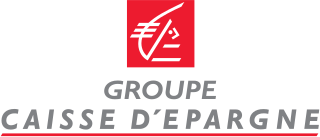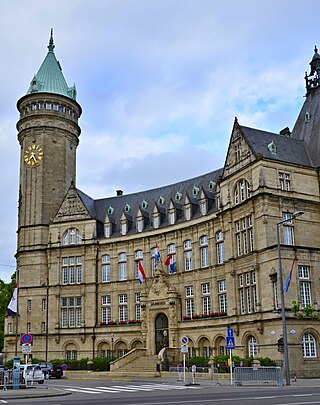
A savings bank is a financial institution whose primary purpose is accepting savings deposits and paying interest on those deposits.

Gabriel-Alphonse Desjardins, born in Levis, Canada East was the co-founder of the Caisses Populaires Desjardins, a forerunner of North American credit unions and community banks. For his contribution to the advancement of agriculture in the province of Quebec, he was posthumously inducted to the Agricultural Hall of Fame of Quebec in 1994.

La Banque postale is a French postal bank, created on 1 January 2006 as a subsidiary of La Poste, the national postal service.

The Eurocheque was a type of cheque used in Europe that was accepted across national borders and which could be written in a variety of currencies.

Cooperative banking is retail and commercial banking organized on a cooperative basis. Cooperative banking institutions take deposits and lend money in most parts of the world.

Slovenská sporiteľňa is the largest commercial bank in Slovakia. It provides comprehensive banking services to more than 2 million clients via the largest distribution network with 400 retail outlets. It administers almost 6 million accounts, which proves its stable position in the Slovak banking sector.

Groupe Caisse d'épargne was a French cooperative banking group, with around, 4700 branches in the country. It started with the founding in 1818 of the Caisse d'Épargne et de Prévoyance de Paris, France's first savings bank. The group was active in retail and private banking, as well as holding a significant stake in the publicly traded investment bank Natixis. In 2009, it merged with Groupe Banque Populaire to form Groupe BPCE. A retail banking network under BPCE still uses the brand name.

The State Bank and Savings Bank, also known by its Luxemburgish name Spuerkeess, is the leading national financial institution founded in 1856 and governed by the law of 24 March 1989. Spuerkeess is a commercial bank wholly owned by the government of Luxembourg.

The European Association of Co-operative Banks (EACB) is a European interest group representing cooperative banks in the European Union (EU) and five non-European countries. Established in 1970, the non-profit association "represents, promotes and defends" the common interests of its 26 member institutions and 2.700 cooperative banks regarding banking as well as cooperative legislation.

EUFISERV is a European interbank network connecting the ATMs of savings banks in Austria, Belgium, the Czech Republic, Finland, France, Germany, Italy, the Netherlands, Norway, Portugal, Spain, Sweden, and Switzerland. It is the largest and the only international credit union-owned interbank network in Europe.

The World Savings and Retail Banking Institute is an international banking association. It currently gathers 100 members in 80 countries throughout the world, comprising approximately 6760 savings and retail banks. At the start of 2018, total assets of WSBI members amounted to USD14,000 billion.

Baron Jean-Conrad Hottinguer was a Swiss-born French banker who later became a Baron of the French Empire.
The European Services Forum (ESF) is a lobby group of representatives from the European services sector that promote the liberalisation of international trade in services. It was created in April 1999 in order to give recommendations to the European Commission in the GATS negotiations of the World Trade Organization. Since 2012, the Forum is supporting the negotiations concerning the Trade in Services Agreement.

Groupe BPCE is a major French banking group formed by the 2009 merger of two major retail banking groups, Groupe Caisse d'Épargne and Groupe Banque Populaire. As of 2021, it was France's fourth largest bank, the seventh largest in Europe, and the nineteenth in the world by total assets. It has more than 8,200 branches nationwide under their respective brand names serving nearly 150 million customers. Its wholesale banking subsidiary Natixis, previously a separately listed company, was delisted and came under full ownership of Groupe BPCE in 2021.
The Liikanen Report or "Report of the European Commission’s High-level Expert Group on Bank Structural Reform" is a set of recommendations published in October 2012 by a group of experts led by Erkki Liikanen, governor of the Bank of Finland and ECB council member. On 3 July 2013, by large majority the European Parliament adopted an own initiative report called "Reforming the structure of the EU banking sector" that welcomes structural reform measures at Union level to tackle concerns on Too big to fail banks, that led to the publication of a proposal of Regulation on structural measures improving the resilience of EU credit institutions in January 2014. This proposal was withdrawn in July 2018.
Nicolas Mérindol, is a French Business executive who was the former CEO of the Groupe Caisse d'Épargne. Since July 2012 he has been the Chairman and Partner of Amilton, a financial services group.
The Sparkassen-Finanzgruppe is a network of public banks that together form the largest financial services group in Germany and in all of Europe. Its name refers to local government-controlled savings banks that are known in German as Sparkasse, plural Sparkassen. Its activity is overwhelmingly located in Germany.

The Algemene Spaar- en Lijfrentekas / Caisse générale d'épargne et de retraite was a major Belgian public bank, originally created in 1850 as a pension institution. It was acquired in stages between 1993 and 1998 by Fortis Group. In 1999 Fortis merged it with Générale de Banque and other operations to form Fortis Bank, which in turn was integrated from 2009 into BNP Paribas.














